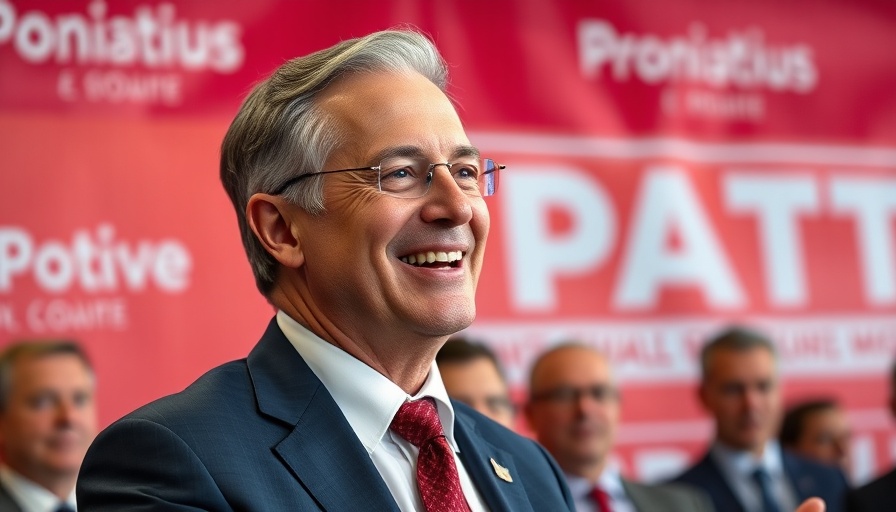
Mark Carney: Canada’s Next Prime Minister Amid Crisis
In a historical turn of events, Canada's Liberal Party has elected Mark Carney, a seasoned central banker, as its leader, paving the way for him to replace Prime Minister Justin Trudeau in the midst of a significant trade crisis with the United States. Carney’s election comes at a time when the Liberal Party is grappling with plummeting public support and facing fierce opposition from rival parties eager to trigger a national election.
Understanding Carney's Political Journey
Born in Fort Smith, Northwest Territories, and raised in Edmonton, Carney’s educational journey led him to Harvard University for a degree in economics, followed by a master’s degree and a doctorate from the University of Oxford. His notable tenure as the Governor of the Bank of Canada from 2008 to 2013, during a global financial crisis, showcased his ability to navigate complex economic landscapes. He later served as the Governor of the Bank of England, further consolidating his experience and credibility on the global stage.
The Economic Landscape: Carney's Challenge Ahead
The timing of Carney's assume-the-office date remains ambiguous; however, he is expected to quickly form a new cabinet. He inherits a deeply fragmented political environment marked by a trade dispute fueled by tariffs imposed by former President Trump, which threaten to plunge Canada’s economy into a recession. Carney’s extensive economic background positions him as a pivotal figure to tackle these urgent economic challenges.
What His Election Means for Canada
With Carney’s victory in the internal party election, which saw him secure a staggering 86% of the votes, the expectation among Canadians is high for a swift and effective transition. His leadership style, characterized by calm yet decisive actions, resonates with many, and he is viewed as potentially the most trusted figure to handle the current economic turmoil. He has already pledged to maintain tariffs on U.S. imports until American authorities show Canada respect in trade negotiations.
Carney's Response to Trump: A Defiant Stand
During his campaign, Carney openly addressed the threats posed by Trump’s administration, including the audacious contention that Canada might become the “51st state” of the U.S. Such sentiments have galvanized a collective response from Canadians, resolved to defend their sovereignty. Carney has described the economic relationship with the U.S. as one where Canada will always stand its ground, asserting, "America is not Canada, and Canada never, ever will be part of America in any way."
Challenges Facing Carney’s Administration
Even as Carney embarks on this political journey, he faces the daunting task of convening a new cabinet and potentially calling a snap election within a few months. The Liberal Party’s waning support, ironically exacerbated by Trump's aggressive stance on trade, could lead to an urgent election as opposition parties vie to take advantage of the political landscape. Carney’s ability to unify a divided party and revitalized Liberal support will be crucial.
Public Reception: Carney’s Popularity Surge
The political climate is notably shifting, with polls recently indicating a surprising resurgence in support for the Liberal Party under Carney’s leadership. His knack for maintaining diplomacy while presenting a firm economic stance resonates well with voters who are increasingly wary of major political shifts due to the pressures from the U.S. His leadership is viewed as a necessary response to counteract any perceived threats against Canadian independence.
Looking Forward: Future Directions for Canada
Carney's transition into the role of prime minister will likely redefine the trajectory of Canadian politics. It represents an opportunity for renewed dialogue on trade, economic resilience, and a united front against external pressures. As a figure with considerable financial acumen and international pedigree, his performance in the coming months will be closely monitored not just by Canadians, but by the international community.
As Carney prepares to take office, many Canadians remain hopeful for a turnaround in their national policies that emphasize economic integrity and resilience amidst tumultuous times.
Get Involved!
Stay updated on the latest developments by following news articles and engaging in dialogues about Canada’s political future. Understanding how leaders navigate economic crises is crucial for valuing democratic processes and fostering national unity.
 Add Element
Add Element  Add Row
Add Row 



Write A Comment